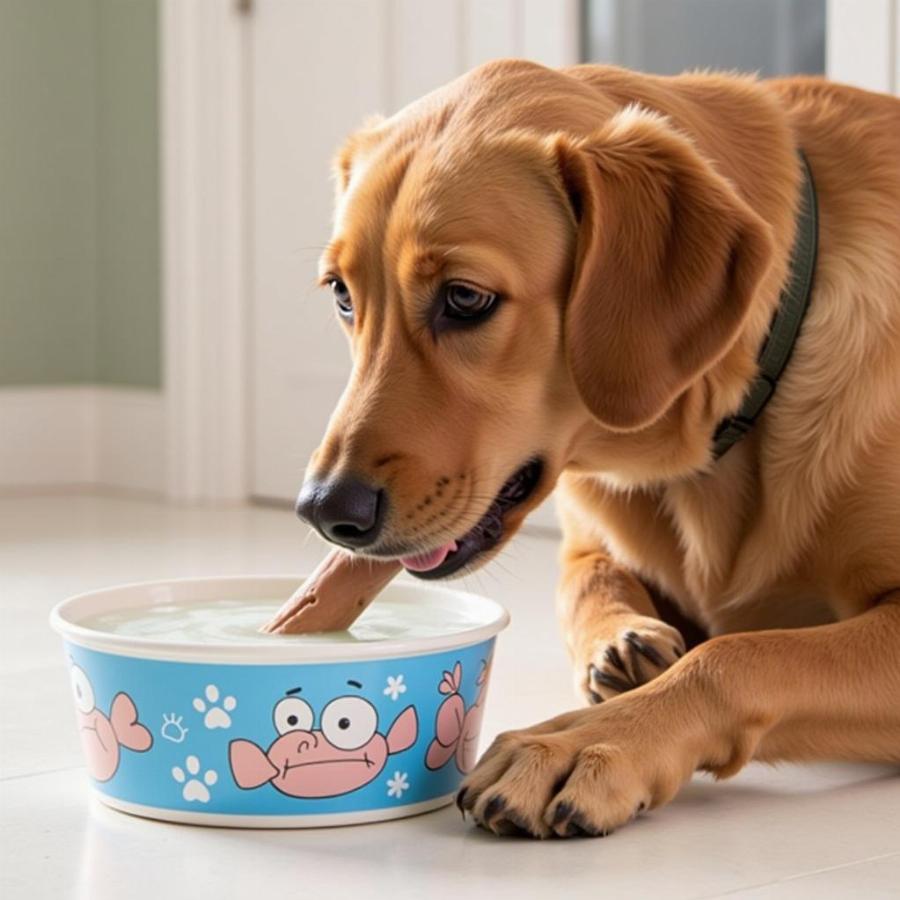Coffee is a morning ritual for many of us, but what about our furry friends? Are coffee grounds bad for dogs? The short answer is yes. While a spilled drop or two might not cause significant harm, coffee grounds, brewed coffee, and coffee beans contain caffeine, which is toxic to dogs. This article will delve into the dangers of caffeine for dogs, the symptoms of caffeine poisoning, and what to do if your dog ingests coffee. We’ll also discuss safe alternatives to coffee for your pup and preventative measures you can take to keep your dog safe.
Why are Coffee Grounds Harmful to Dogs?
Caffeine stimulates the central nervous system in both humans and dogs, but dogs are much more sensitive to its effects. Even small amounts of caffeine can cause a range of unpleasant symptoms, and in larger doses, it can be life-threatening. The caffeine content in coffee grounds is even higher than in brewed coffee, making them especially dangerous for our canine companions.
How Much Caffeine is Toxic for Dogs?
The toxic dose of caffeine for dogs is approximately 140mg/kg of body weight. This means that a small dog could experience serious symptoms after ingesting a relatively small amount of coffee grounds, while a larger dog might tolerate a slightly higher amount before showing signs of distress. However, it’s crucial to remember that any amount of caffeine can be harmful, and it’s always best to err on the side of caution.
Symptoms of Caffeine Poisoning in Dogs
If your dog ingests coffee grounds, watch for these symptoms:
- Restlessness and hyperactivity
- Panting and rapid breathing
- Elevated heart rate
- Vomiting and diarrhea
- Muscle tremors and seizures
- Loss of coordination
- Elevated body temperature
- Collapse and even death in severe cases
What to Do If Your Dog Ingests Coffee
If you suspect your dog has ingested coffee or coffee grounds, contact your veterinarian or an animal poison control center immediately. Time is of the essence when dealing with caffeine poisoning. They may induce vomiting or administer activated charcoal to help absorb the caffeine. Do not try to treat your dog at home without professional guidance.
Keeping Your Dog Safe from Coffee
Prevention is key when it comes to protecting your dog from caffeine. Here are some tips to keep your furry friend safe:
- Store coffee grounds, beans, and brewed coffee out of reach.
- Be mindful of spilled coffee and clean it up immediately.
- Don’t leave coffee cups unattended.
- Educate family members, especially children, about the dangers of caffeine for dogs.
Alternatives to Coffee for Your Pup
While you enjoy your morning coffee, offer your dog a safe and healthy treat, such as a chew toy or a small piece of dog-friendly fruit. Water is always the best beverage for your dog.
 Safe alternatives for dogs
Safe alternatives for dogs
Conclusion
Are coffee grounds bad for dogs? Absolutely. Caffeine is toxic to dogs and can cause a range of serious health problems. By understanding the risks and taking preventative measures, you can keep your beloved companion safe and healthy. Never hesitate to contact your veterinarian if you suspect your dog has ingested coffee.
FAQ
- Can dogs drink decaf coffee? No, decaf coffee still contains small amounts of caffeine which can be harmful to dogs.
- What are the long-term effects of caffeine poisoning in dogs? Repeated exposure to caffeine can lead to heart problems and other health issues.
- How long does it take for caffeine poisoning symptoms to appear in dogs? Symptoms can appear within 30 minutes to an hour after ingestion.
- Can dogs eat chocolate-covered coffee beans? No, both chocolate and coffee are toxic to dogs.
- Are there any home remedies for caffeine poisoning in dogs? No, always consult with a veterinarian immediately.
- What should I tell my vet if my dog ingested coffee? Be prepared to tell your vet how much coffee your dog ingested and when.
- What other foods and drinks are toxic to dogs? Other toxic foods include grapes, raisins, onions, garlic, and xylitol (artificial sweetener).
Related Articles
Beaut Dogs is your trusted source for all things dog-related, providing valuable information to help you provide the best care for your canine companion. When you need support, contact us at Email: [email protected] for detailed and accurate answers from Beaut Dogs. We are dedicated to empowering dog owners with the knowledge and resources they need to ensure their furry friends live long, happy, and healthy lives. Visit Beaut Dogs today to explore more!